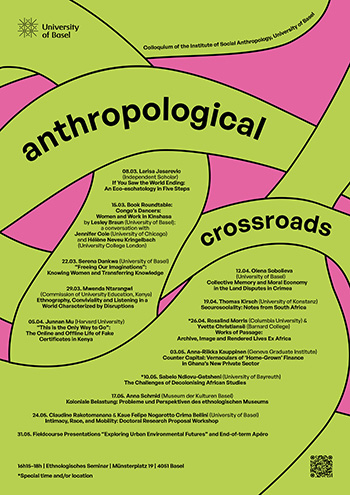Ort: Basler Afrika Bibliographien, Klosterberg 23, 4051 Basel
Veranstalter:
Joint Session with Basler Afrika Bibliographien and Namibian and Southern African Studies
Works of Passage: Archive, Image and Rendered Lives Ex Africa

Apprenticeships: Learning to (Re)Read Colonial Archives, Expectations and Possibilities (Yvette Christiansë)
Archival practice is sometimes approached through a hermeneutics of suspicion, and is often suffused by narratives of heroic exploration and discovery. This is particularly so in the historiography of slavery and anti-slavery in and from ‘Africa,’ where repeated claims to seeing what no one else has seen impels the knowledge-production enterprise. But constant suspicion is sometimes a distraction, even an invitation to self-heroization. It deflects the necessity of a never-ending apprenticeship in the histories by which scholarly ‘suspicion’ has been entangled with the epistemic structures and suspicious reading methods governing both slavery and anti-slavery. Taking the task of such an apprenticeship seriously, this paper is concerned with those about whom so much is written in the records of anti-slavery in the trade’s longue durée in the Indian Ocean—even after its formal abolition. It moves between archival document, popular discourse of the colonial era, and my own efforts to find writerly forms that navigate these texts and the experiences glimpsed within them.
Desiring Documents, Risking Visibility: Image and the Documentary Gesture in Deindustrializing South Africa (Rosalind Morris
For almost a century, opposition to racial segregation in South Africa (and southern Africa more broadly) entailed resistance to passbooks, and mandatory documentation. Identity documents were synonymous with surveillance and exposure to racialized state violence, which was both implemented and resisted in distinctly gendered forms. Today, a lack of papers entails a different kind of vulnerability for many of the most impoverished, exiled as they are to the wastelands of global extractivist capital and excluded by postcolonial re-nationalization. A desire for entry into official documentary records and other forms of visibility is thus a generalized aspiration among them. This aspiration entails a variety of risks and is often ambivalent. It is often inscribed within a political configuration wherein power is not confined to state actors and civil society, but is also exercised by local and international gangs. The desire to be seen and known, to have an image that travels, nonetheless exceeds instrumental functions and political purposes. It has its own histories of aesthetic elaboration in the poetic and other artistic works of self-documentation and self-expression in southern Africa. In this paper, I consider some of these issues and gestures, and discuss the motivations, risks and possible accomplishments of an ethnographic and documentary practice that extends to non-narrative and cinematic forms, to move with the ambitions of otherwise effaced subjects as they aspire to be seen and heard by others.
Veranstaltung übernehmen als iCal
Quick Links
